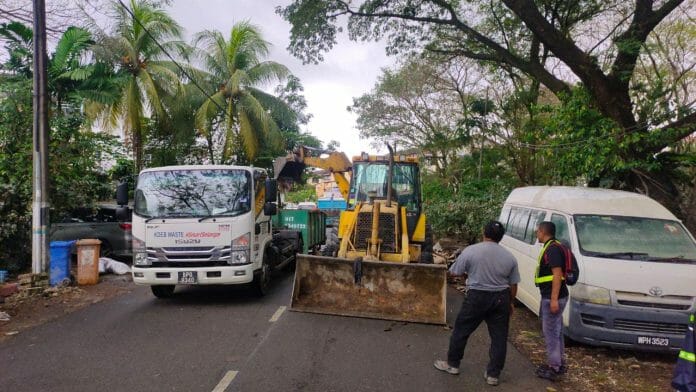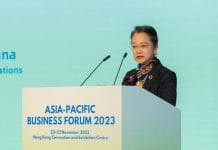By Ahadi Mohd Nasir
Malaysia faces a significant waste management challenge as a result of rapid urbanization and population increase.
Each day, the nation generates an astonishing 38,427 metric tonnes of solid waste, a number projected to swell to 49,670 tonnes daily by 2030.
Amid this escalating waste crisis, KDEB Waste Management (KDEBWM), wholly-owned by the Selangor state government emerged as an innovative leader.
KDEBWM manages an astounding 7,000 tonnes of waste daily throughout Selangor, placing it at the forefront of Malaysia’s waste management sector.
Yet, what truly distinguishes KDEBWM is not just the scale of its operations, but its unwavering commitment to sustainability and carbon reduction.
This commitment is epitomized by its support for the National Energy Transition Roadmap (NETR), a visionary initiative aimed at propelling
Malaysia toward a sustainable, low-carbon future.
This article delves into KDEBWM’s transformative journey – from waste bins to renewable resources – exploring how its approaches align with NETR’s objectives and contribute to reducing Malaysia’s carbon footprint.
Understanding NETR
In the pursuit of a sustainable and low-carbon future, Malaysia embarks on a transformative journey guided by NETR.
Officially unveiled on July 27, 2023, this visionary roadmap marks a pivotal moment in our nation’s quest to attain a net-zero greenhouse gas emissions target by 2050.
NETR aligns seamlessly with our nation’s aspirations for sustainable development, social equity, and balanced progress. Among NETR’s key focal points lies the strategic management of Municipal Solid Waste (MSW).
Annually, Malaysia generates a substantial 13.9 million tonnes of MSW, a figure on an upward trajectory. MSW represents a burgeoning source of bioenergy, with potential as a feedstock for power generation through waste-to-energy (WTE) technologies.
WTE processes involve the conversion of waste materials into energy, such as electricity, heat, or biofuel. By harnessing waste as a feedstock for energy production, WTE technologies mitigate the volume of waste sent to landfills, while simultaneously providing a sustainable source of renewable energy.
In this journey towards a greener, more sustainable future, MSW assumes a pivotal role in NETR’s success.
It aids in reducing our carbon footprint and expedites our transition to a lowcarbon economy. The synergy between NETR and MSW, with the integration of WTE technologies, promises to steer in a cleaner and more energy-efficient Malaysia.
Leading the Charge in Selangor’s Waste Management Landscape
KDEBWM plays a pivotal role in Malaysia’s waste management sector, servicing 6.5 million residents and 2 million taxpayers, primarily in Selangor, a densely populated state.
Our mission is to maintain cleanliness and public health while embracing sustainability.
KDEBWM offers a range of services, including efficient residential waste collection and proper disposal, street cleaning, public space maintenance, and responsible waste management for industrial, commercial, and institutional (ICI) sectors.
We also champion recycling initiatives to contribute to sustainable resource management.
Dedication Across Selangor
KDEBWM currently serves all 12 municipalities in Selangor, operating with a substantial fleet of 1,100 units. We collaborate with over 1,000 subcontractors, maintain a dedicated workforce of over 10,000 individuals, and manage five Recycling Centers with our strategic partners.
Our Recycling Centers have successfully diverted approximately 600 metric tons of recyclables per month from ending up in landfills, showcasing our commitment to environmental sustainability.
A Vision for a Cleaner Selangor
With a vision to become a leading waste management company dedicated to a cleaner and healthier Selangor, KDEBWM’s mission is to provide integrated solid waste management solutions. We leverage technology and community engagement to create a more environmentally friendly Selangor.
Established in 1996 as a subsidiary of the Selangor State Government through Menteri Besar Selangor Incorporated (MBI Selangor), KDEBWM began active operations in 2016 in Majlis Perbandaran Klang (MPK) as a pilot project.
Today, we manage an impressive daily average of about 7,000 tons of waste, establishing ourselves as a prominent waste management
company in Malaysia.
From Bins to Renewables
To support the NETR, KDEBWM has ventured into waste-to-energy (WTE) solutions, recognizing that it is the most effective solution to address the challenges posed by increasing waste quantities and the scarcity of landfill space.
This evolution aligns seamlessly with our commitment to supporting NETR’s objectives and reducing our carbon footprint.
A significant development underscores our commitment to environmental sustainability— KDEBWM, in collaboration with YTL Power International Bhd, is embarking on the establishment of a 2,400-tonne-per-day waste-to-energy (WTE) plant in Rawang, Selangor.
This plant, named the Sultan Idris Shah Green Energy Plant, serves as a vital component of the larger Selangor Green Energy Eco Park (SGEEP) project, with a total estimated cost of RM4.5 billion.
The development is planned to span over 10 years and will be executed in four distinct phases. The primary objective of this ambitious initiative is to harness municipal solid waste (MSW) from various areas and convert it into an impressive 58 megawatts of electricity for the first phase.
For all four phases combined, the total power generated will be 130.5 megawatts, inclusive of 45 megawatts from solar sources. The Sultan Idris Shah Green Energy Plant represents the inaugural phase of the SGEEP development, requiring an estimated investment of RM1.5 billion.
This state-of-the-art facility not only advances sustainable waste management practices but also creates substantial employment opportunities, thereby fostering economic growth and progress in the region.
As waste quantities continue to rise, finding sustainable disposal solutions becomes imperative. Traditional landfilling not only consumes precious land resources but also contributes to greenhouse gas emissions, mainly in the form of methane.
WTE, on the other hand, offers a comprehensive and environmentally friendly approach. Its plants utilize advanced technologies to efficiently convert municipal solid waste (MSW) into renewable energy.
By burning MSW at high temperatures in a controlled environment, we maximize the energy recovery while minimizing environmental impact. This method not only reduces the volume of waste destined for landfills but also helps mitigate the release of methane, a potent greenhouse gas.
Furthermore, the adoption of WtE aligns with global trends in waste management. Our closest neighbouring countries, including Singapore, Thailand, and Indonesia, have already embraced WtE technology to address their waste challenges effectively.
These countries recognize that WTE is a sustainable solution that not only reduces waste disposal pressures but also generates clean energy in the process.
KDEBWM’s commitment to implementing WTE solutions not only supports the NETR’s objectives but also places us on par with our regional counterparts in adopting environmentally responsible waste management practices.
Through WTE, we are actively contributing to the reduction of carbon emissions and the creation of a cleaner, more sustainable future for
Selangor and Malaysia as a whole.
Analysis of How KDEB’s Approach Reduces Carbon Emissions
KDEBWM’s WTE approach to waste disposal significantly reduces carbon emissions. By converting waste into renewable energy, it minimizes the release of methane, a potent greenhouse gas typically produced in landfills.
Moreover, the electricity generated through waste-to-energy reduces the reliance on carbon-intensive fossil fuel-based power generation.
Impact on Carbon Footprint
The use of WTE technology has a substantial effect on mitigating our carbon emissions. The conversion of MSW into renewable energy yields various significant advantages:
- Emission Reduction: The controlled combustion of waste produces significantly fewer greenhouse gas emissions compared to landfilling, which releases methane, a potent greenhouse gas.
- Energy Generation: The electricity generated through waste-to-energy replaces the need for fossil fuel-based energy sources, further reducing carbon emissions.
- Resource Conservation: Recycling efforts, coupled with energy recovery from waste, reduce the need for raw materials and the associated carbon emissions from their extraction and production.
Conclusion
In our unwavering commitment towards supporting NETR and reducing our carbon footprint, it’s imperative to reshape public perceptions regarding waste management practices, focusing on both recycling and WTE technologies.
Recycling is a proven method for sustainable resource management that significantly reduces carbon emissions by conserving energy and reducing the need for raw material extraction.
Many countries have embraced recycling as a key strategy for waste reduction and environmental preservation, aligning with the goals of NETR. By recycling, we actively reduce the carbon footprint associated with manufacturing new products, contributing to a cleaner, more sustainable future for our nation.
Likewise, WTE technology, which safely converts MSW into renewable energy, has evolved into a reliable and environmentally friendly waste disposal method. Numerous developed nations, such as Denmark and Singapore, have successfully implemented WTE plants, demonstrating their safety and efficiency in waste management practices.
These technologies align with stringent environmental protocols and contribute to reduced greenhouse gas emissions, making them integral in achieving NETR’s objectives for a low-carbon future.
While we understand the concerns of the public regarding the safety of WTE technology, it’s important to emphasize that this technology is relatively safe and adheres to stringent environmental protocols.
Our firsthand experiences from visits to WTE facilities abroad have shown that some of these facilities are developed close to urban areas with state-of-the-art designs.
These plants operate efficiently with minimal sound, are virtually odorless, and emit clean, harmless air. We firmly believe that relevant authorities, such as the Department of Environment (DOE), play a critical role in ensuring the safety and environmental friendliness of WTE by rigorously assessing the specific technologies used, the type of waste processed, and the pollution control measures in place.
To further bolster public confidence in these waste management approaches, experts in the field of WtE can help convey the safety and sustainability of this waste management approach.
By showcasing global success stories and expert insights, we aim to change public perceptions, promoting the acceptance of these methods as vital tools in achieving NETR’s objectives and advancing towards a more sustainable, low-carbon future.
This article is written by KDEB Waste Management (KDEBWM) Project Delivery and Subsidiary Management general manager Ahadi Mohd Nasir.









